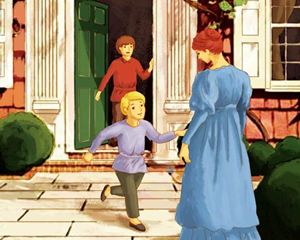At four o'clock we lunched on bread and goat's-milk cheese, as we sat on the sofa; and when we rose, I do not know why, but my father did not wish me to brush off the back, which the little mason had spotted with white, from his jacket: he restrained my hand, and then rubbed it off himself on the sly. While we were playing, the little mason lost a button from his hunting-jacket, and my mother sewed it on, and he grew quite red, and began to watch her sew, in perfect amazement and confusion, holding his breath the while. Then we gave him some albums of caricatures to look at, and he, without being aware of it himself, imitated the grimaces of the faces there so well, that even my father laughed. He was so much pleased when he went away that he forgot to put on his tattered cap; and when we reached the landing, he made a hare's face at me once more in sign of his gratitude. His name is Antonio Rabucco, and he is eight years and eight months old.
到了四时,我们坐在安乐椅上,吃牛油面包。等大家离开了椅子,我看见“小石匠”上衣上粘着的白粉沾在椅背上了,就想用手去抗。不知为什么,父亲忽然抑住我的手。过了一会儿,父亲自己偷偷地拭净了。我们在游戏中,“小石匠”上衣的纽扣忽然落下了一个,我母亲替他缝缀。“小石匠”红了脸在旁看着。我将滑稽画册给他看。他不觉一一装出画上的面式来,引得父亲也大笑了。回去的时候,他非常高兴,以至于忘记了戴他的破帽。我送他出门,他又装了一次兔脸给我看,当做答礼。他名叫安东尼阿·拉勃柯,年纪是八岁零八个月。

Do you know, my son, why I did not wish you to wipe off the sofa? Because to wipe it while your companion was looking on would have been almost the same as administering a reproof to him for having soiled it. And this was not well, in the first place, because he did not do it intentionally, and in the next, because he did it with the clothes of his father, who had covered them with plaster while at work; and what is contracted while at work is not dirt; it is dust, lime, varnish, whatever you like, but it is not dirt. Labor does not engender dirt. Never say of a laborer coming from his work, "He is filthy." You should say, "He has on his garments the signs, the traces, of his toil." Remember this. And you must love the little mason, first, because he is your comrade; and next, because he is the son of a workingman.
安利柯啊!你去拭椅子的时候,我为什么阻止你,你不知道吗?因为如果在朋友面前拭,那就无异于骂他说:“你为什么把这弄龌龊了?”他并不是有意弄污,并且他衣服上所沾着的东西,是从他父亲工作时拈来的。凡是从工作上带来的,决不是龌龊的东西,不管他是石灰、是油漆或是尘埃,决不龌龊。劳动不会生出龌龊来,见了劳动者的人,决不应该说“啊!龌龊啊!”应该说“他身上有着劳动的痕迹。”你不要把这忘了!你应该爱“小石匠”,一则他是你的同学,二则,他是个劳动者的儿子。
ThyFather.
——父亲——













